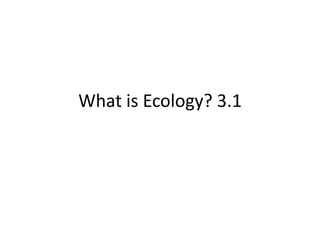Recommended
More Related Content
What's hot
What's hot (20)
Viewers also liked
Viewers also liked (14)
SDPM - Lecture 2 -The STEP WISE Approach to Project Planning

SDPM - Lecture 2 -The STEP WISE Approach to Project Planning
Project Planning Basics - Everything you need to start managing a project

Project Planning Basics - Everything you need to start managing a project
Similar to Biology 3 1
This lecture provides the fundamental concept; an understanding of the relationship that organisms share and their interaction with the environment. Ecology 407 Organism and their Interaction with their environment

Ecology 407 Organism and their Interaction with their environmentStella Maris Polytechnic; Mother Patern College of Health Sciences
Similar to Biology 3 1 (20)
Blue and White Professional Science Project Presentation.pdf

Blue and White Professional Science Project Presentation.pdf
Blue and White Professional Science Project Presentation.pdf

Blue and White Professional Science Project Presentation.pdf
Ecology 407 Organism and their Interaction with their environment

Ecology 407 Organism and their Interaction with their environment
More from Tamara
More from Tamara (20)
Biology 3 1
- 1. What is Ecology? 3.1
- 2. Ecology Scientific study of interactions among organisms and between organisms and their environment.
- 3. Biosphere Part of Earth in which life exists including land, water, and air or atmosphere.
- 4. Species Group of similar organisms that can breed and produce fertile offspring.
- 5. Population Group of individuals of the same species that live in the same area.
- 6. Community Assemblage of different populations that live together in a defined area.
- 7. Ecosystem Collection of all the organisms that live in a particular place, together with their nonliving environment.
- 8. Biome Group of ecosystems that have the same climate and dominant communities.
- 9. Key Concept What different levels of organization do ecologists study? To understand relationships within the biosphere, ecologists ask questions about events and organisms that range in complexity from a single individual to the entire bioshpere.
- 10. Key Concept What methods are used to study ecology? Regardless of the tools they use, scientists conduct modern ecological research using three basic approaches: observing, experimenting, and modeling. All of these approaches rely on the application of scientific methods to guide ecologists inquiry.
